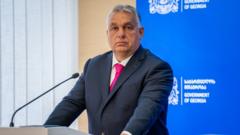In a recent visit to Tbilisi, Hungarian Prime Minister Viktor Orban celebrated an election result deemed dubious by many observers, upholding Georgia's leadership as a model of democracy. His remarks followed a tense election period that saw allegations of vote suppression and manipulation, yet Orban publicly praised the process as “free and democratic.” This essentially contradicts the position of the European Union, which stressed that international observers had not found the elections to be legitimate and voiced concern over the escalating authoritarian tendencies in Georgia under the ruling Georgian Dream party.
Orban's comments came only days after Georgian President Salome Zourabichvili condemned the election, suggesting that a “Russian special operation” had influenced the outcome. During his discussions with Georgian Prime Minister Irakli Kobakhidze, Orban defended the result, criticizing what he sees as bias in how elections are perceived depending on the political party in power. “If liberals win, they shout democracy; if conservatives win, they claim it’s not democratic,” he remarked.
Despite growing international scrutiny from both the United States and European Union to investigate the electoral process's integrity, Orban's stance remained unchanged, even as protests erupted from citizens dissatisfied with the election results. Observers, particularly from the Georgian monitoring group “My Vote,” reported numerous infractions, including coercion of public workers to vote a certain way and multiple instances of vote tampering, such as carousel voting, where individuals cast multiple votes.
In a contrasting narrative, Georgia's Prime Minister vehemently rejected any claims of wrongdoing regarding the election. He stated that the elections aligned with legal standards and described allegations of pro-Russian sentiment within the government as unfounded.
In an even more alarming development, the Georgian election commission publicly refuted accusations of irregularities, suggesting that the very notion of duplicate votes is impossible due to stringent verification systems. Yet, opposition figures and independent organizations continue to highlight systemic flaws, calling for an independent examination of the election's legitimacy.
The criticism of Orban's visit reveals the growing rift between Hungary and other EU nations, particularly as Hungary currently holds the EU presidency. Both Orban and his foreign minister defended their assertions about the Georgian elections, ignoring the concerns raised by the broader European community. Meanwhile, activists like Eka Gigauri from Transparency International echoed the sentiment of disillusionment, stating the Georgian political landscape feels stifled and dominated by the ruling party.
As the aftermath of the election continues to unfold, the international community watches closely, aware of the implications for Georgia's democratic trajectory.



















